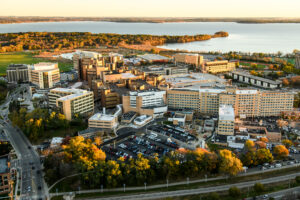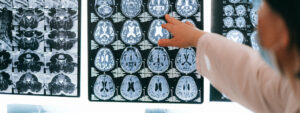
Leadership Profile: Director, Carbone Cancer Center
The University of Wisconsin School of Medicine and Public Health invites applications and nominations for the position of Director of the Carbone Cancer Center.
The Opportunity
The University of Wisconsin Carbone Cancer Center at the University of Wisconsin School of Medicine and Public Health is the only comprehensive cancer center in the state of Wisconsin. It was designated by the National Cancer Institute (NCI), the lead federal agency for cancer research, in 1973 as one of the first six Comprehensive Cancer Centers in the United States.
The center’s setting within a top-tier university and the nation’s first School of Medicine and Public Health is key to success. An integral part of the school and its associated health system, Carbone unites clinicians and scientists who work together in translating discoveries from research laboratories into new treatments and procedures that benefit cancer patients. The center provides cancer care to more than 33,000 people annually through prevention, diagnosis, treatment and survivorship care.
Scientists at the university have made an enormous impact on the field of cancer research and the improvement of cancer patient care and outcomes, dating back to the 1930s and ‘40s. Research highlights from work at UW–Madison include the invention of Mohs surgery and 5-fluorouracil, establishment of SPF ratings, development of lifesaving immunotherapies, development of the TomoTherapy radiation therapy treatment system, development of tamoxifen, the first successful bone marrow transplant and more. As they perform the full continuum of basic, clinical and translational research, faculty researchers lead dynamic programs that are currently organized into six areas: cancer prevention and control, cancer genetic and epigenetic mechanisms, developmental therapeutics, human cancer virology, imaging and radiation sciences and tumor microenvironment.
The center serves all 72 counties in Wisconsin and beyond through patient care, research, community engagement and outreach. Members of the center highly value and prioritize their relationships with communities across the state, particularly under-resourced areas and populations such as rural counties, racially and ethnically diverse groups, and populations with significant disparities in incidence and outcomes relating to cancer. Embodying the Wisconsin Idea — that the university should influence people’s lives beyond the boundaries of the classroom — Carbone members foster enduring, bi-directional community relationships across the state as they collaborate with community organizations, affiliated health systems, regional networks and global partners, and share groundbreaking research to result in a global impact.
The director will lead the center’s team and further its mission to find the best ways to prevent, detect, diagnose and treat cancer, inspiring new cancer research findings and helping to translate them into clinical care for the benefit of patients. The individual will help meet the center’s goals centered on research, patient and partnerships by embodying its foundational principles and focusing on Wisconsin communities and beyond, advancing discovery and technology and cultivating diversity, equity and inclusion.
The successful candidate will be an innovative leader in the field of cancer research with a history of NCI funding, who brings strong clinical, research and education experience to the role, as well as skills in strategic management and leadership.
Organization Overview
UW–Madison
Since 1848, this campus has been a catalyst for the extraordinary. As a public land-grant university and one of the most prolific research institutions in the world, UW–Madison is home to those who are driven by a desire to both explore new worlds and to apply new ideas to real-world problems.
With a total annual budget of over $3.7 billion, including more than $1.52 billion in annual research expenditures, UW–Madison has been in the top 10 in national research spending every year since 1972. The campus is home to more than 25,000 faculty and staff and 50,000 undergraduate, graduate and professional degree students. Members of the student body represent all 50 states and 116 countries. The university was ranked the number two public university in Washington Monthly’s 2023 College Guide and Rankings and is ranked 12th among public institutions in U.S. News & World Report’s 2023–24 rankings of best colleges.
The Wisconsin Idea — the principle that the university should improve people’s lives beyond the classroom — has been guiding the efforts of UW–Madison Badgers for more than a century. The university has been dedicated to studying poverty and social inequity for 50 years, is consistently ranked among the top large schools for producing Peace Corps volunteers and boasts 20 Nobel Prize winners among its faculty and alumni.
For me, the Wisconsin Idea is the clear vision for what a public university is and should be. I want to celebrate it as a national and even global model for why public universities matter. It’s my goal to keep our teaching, research, and outreach missions strong, to support our students, and to make the university a more diverse and inclusive place to live, learn, and work.
- Jennifer L. Mnookin, Chancellor
School of Medicine and Public Health
The University of Wisconsin School of Medicine and Public Health (SMPH) is recognized as an international, national, and statewide leader in education, research, and service. Founded in 1907, it transformed into the nation’s first School of Medicine and Public Health in 2005 to integrate the principles and power of interwoven medical and public health approaches in all of its missions.
With more than 5,500 employees, including over 2,000 faculty, the school’s engagement spans the entire state of Wisconsin and includes a deep commitment to improving population health. This commitment manifests itself in innovative models that serve as paradigms for the rest of the country.
Members of the school rapidly translate discovery into application and continually foster synergies between clinical care, education and research. Consistently ranked among the nation’s top medical schools, SMPH has established high-performance academic programs that are intentionally distributed across the entire spectrum of academic medicine. The school is ranked 22nd in National Institutes of Health funding for schools of medicine in 2023, according to rankings from Blue Ridge Institute for Medical Research. Its faculty members hold appointments in 27 departments — 17 in the clinical sciences and 10 in the basic sciences. The faculty is composed of some of the nation’s leading researchers, educators and clinicians. This includes several National Medal of Science recipients and National Academy of Science honorees.
Mission and Values
The mission of the school is to advance health and health equity through remarkable service to patients and communities, outstanding education and innovative research. Members of the school community uphold the values of integrity and accountability, compassion, diversity, equity and inclusivity and excellence. The school’s Shared Guidelines for Professional Conduct help the SMPH community embody these values in their daily activities.
Fostering a diverse and inclusive community is important both as an end in itself and as a valuable driver of eliminating health disparities. The school strives to be comprised of a diverse, inclusive academic community committed to excellence and equity in health; wellness through teaching and learning, clinical service, and advocacy; and research in all forms of biological science, population health science, and health care.
SMPH is dedicated to creating an inclusive, collaborative, respectful, and welcoming environment in which all faculty, students, and staff will thrive. This effort is referred to as Building Community, and includes a call to action for every SMPH member to examine not only our intent, but our impact — “Every Person. Every Action. Every Time.”
UW Health
UW Health is the primary teaching affiliate of the University of Wisconsin–Madison, serving more than 800,000 patients each year in the upper Midwest and beyond with more than 1,800 physicians and 24,000 staff across six main hospitals and more than 90 outpatient sites. The health system’s total system joint operating agreement revenues are $5.1 billion. UW Health is a separate 501(c)3, governed by the UW Hospitals and Clinics Authority, and partners with UW School of Medicine and Public Health to fulfill patient care, research, education and community service missions. In 2015, SwedishAmerican, a community health system based in Rockford, Ill., became part of UW Health and in 2021, SwedishAmerican was rebranded UW Health. UW Health Hospitals, which includes University Hospital on the UW–Madison campus and UW Health East Madison Hospital on the east side of Madison, has been ranked No. 1 in Wisconsin for 12 years in a row by U.S. News and World Report.

University Hospital is one among a select set of U.S. hospitals named to Newsweek’s “Top 100 Global” list, which includes hospitals in 11 countries around the world. American Family Children’s Hospital is also nationally ranked as a top children’s hospital. UW Health has been designated by the Human Rights Campaign Foundation as a Leader in LGBTQ Healthcare Equality in the Healthcare Equality Index for several years.
University of Wisconsin Carbone Cancer Center
The University of Wisconsin Carbone Cancer Center serves as the hub for cancer research and care within the School of Medicine and Public Health and UW Health, as well as across the state of Wisconsin. It is the first and only NCI-designated Comprehensive Cancer Center in Wisconsin, having been initially designated in 1973. It has successfully maintained this esteemed designation for the last 50 years and has a successive peer review rating of “outstanding,” placing it in the top 10-20 percent of all 70 NCI-designated cancer centers in the United States. Carbone attracts top researchers and physicians with the opportunity to perform ground-breaking work and draws patients from across Wisconsin and beyond to receive state-of-the-art cancer care.

In a testament to its multidisciplinary nature, the center has representation from across campus and its members are involved in hundreds of research projects, clinical trials, educational activities and outreach programs. The center’s director, associate directors and other key figures act as servant-leaders who further the center’s mission by serving faculty members, employees, patients and the state. They strive to engage all members of the center as they listen to employees, understand and recognize researcher needs, practice continuous evaluation and improvement and foster collaboration. Carbone’s facilities feature 389,000 square feet of contiguous and collaborative research space.
Carbone by the numbers:
- More than 350 researchers, representing 55 academic departments in 11 schools and colleges across the UW–Madison campus
- More than 33,000 patients each year
- More than 250 annual clinical trials
- Over 800 ongoing funded research ideas and discoveries
- Over 400 trainees in clinical care and research
- Over 130 outreach engagements
- 25 annual community events
- 3 community, patient or underrepresented advisory boards
- 8 statewide stakeholder groups
A rich history of cancer research and patient care has resulted in incredible partnerships under the umbrella of the Carbone Cancer Center. The school’s Department of Human Oncology was established in 1975, shortly after Carbone’s first NCI designation. In 1999, the esteemed McArdle Laboratory for Cancer Research and Carbone unified under a single NCI designation. Faculty in the Department of Medicine’s Division of Hematology, Medical Oncology and Palliative Care also play a critical role in the center.
The scientific mission of the center is organized around six scientific programs that encompass laboratory research, clinical research, population sciences and advanced research training. Current research priorities include advancing diagnostic imaging and theranostics; pushing forward precision, immunologic and biomarker-driven clinical interventions; and improving cancer modeling from basic discovery through populations.
Cancer patient care, including numerous specialist clinics, is focused at the center’s central location at 600 Highland Ave. in Madison, with additional clinics located throughout Madison, as well as in the region in Johnson Creek and Waukesha. Additionally, in 2015, SwedishAmerican, a community health system based in Rockford, Ill., became part of UW Health, and as a result UW Health | Carbone Cancer Center Rockford serves this area.
The center has established and maintains numerous regional and state partnerships. Examples include the Big Ten Cancer Research Consortium, a clinical trials collaboration among Big Ten cancer centers to benefit more patients around the country; Precision Medicine Molecular Tumor Board, a UW Carbone panel of expert clinicians and scientists who analyze tumor samples from patients across Wisconsin and recommend targeted therapies; and Wisconsin Community Advocacy Board, which has diverse representation around the state to reduce cancer care disparities in rural areas and among communities of Color.
Qualifications and Attributes of Leadership
The successful candidate will have a compelling vision for the future of cancer care and research in a leading public academic institution and medical center. They should have a record of successful leadership and management in an academic, policy, health care and/or research setting. The director will possess proven leadership and management skills as well as an outstanding academic background and dedication to furthering diversity of the faculty, staff and students in the department and establishing an inclusive and professional work environment.
Applicants must have a MD, MD/PhD, DO or equivalent degree(s); must be board certified; eligible for a Wisconsin medical license; have a substantial record of achievement in administrative leadership, clinical care, teaching across the full continuum of learners; and a strong academic background with a history of peer-reviewed funding that would qualify for appointment as a tenured professor at the University of Wisconsin–Madison.
The Community
Located on an isthmus between two lakes, Madison is the capital city of the state of Wisconsin. Madison has been voted in the top 100 Best Places to Live in the USA (Liveability, 2023) and the #1 City for Most Successful Women Per Capita (Forbes, 2019). Madison is also:
City for Best Work-Life Balance (SmartAsset, 2022)
Best City for STEM Professionals (CEO World, 2020)
Best State to Practice Medicine (WalletHub, 2022)
Madison’s technology economy is growing rapidly, and the region is home to the headquarters of Epic Systems, Exact Sciences, American Family Insurance, American Girl (Mattel), Sub-Zero, and Lands’ End, as well as many biotech, health care IT and health systems startups.
The city of Madison and the University of Wisconsin–Madison acknowledge that they occupy ancestral Ho-Chunk land. The School of Medicine and Public Health recognizes the health inequities faced by Native communities and pledges facilitate learning and take action across all of its missions.
Madison is the second largest city in the state, with a city population of approximately 273,000 and regional population of over 1 million. It is the fastest-growing county in the state of Wisconsin. The city is within easy driving range of Chicago and Milwaukee. Madison offers numerous unique neighborhoods and commercial areas including the Capitol Square, State Street, Willy Street, Shorewood Hills, Maple Bluff, and Hilldale. Suburbs and surrounding smaller communities include Sun Prairie, Middleton, McFarland, Verona, Cottage Grove, Waunakee and Fitchburg.

Madison is home to one of the strongest local food scenes in the country with several James Beard Award winners, gastropubs and farm-to-table restaurants. From April to October, the Capitol Square hosts the impressive Dane County Farmers’ Market, the largest producer-only farmers’ market in the country. The city is rich with cultural offerings such as the Overture Center for the Performing Arts, Orpheum Theatre, Concerts on the Square, Jazz at Five, UW–Madison Mead Witter School of Music and Hamel Music Center, Madison Symphony Orchestra, Madison Opera, Madison Ballet, UW–Madison Chazen Museum of Art, Madison Museum of Contemporary Art, Wisconsin Historical Museum, and Madison Children’s Museum, among others.
The city has a dedicated athletics fanbase which largely centers around the University of Wisconsin–Madison. Sports venues include Camp Randall Stadium, the Kohl Center, LaBahn Arena, Wisconsin Field House and the Alliant Energy Center. Madison is home to Forward Madison FC, the first professional soccer team in the city, as well as the Madison Mallards, a college wood-bat summer baseball league team. Marquee endurance sports and specialty sporting events include IronMan Wisconsin and IronMan 70.3, Reebok CrossFit Games, Madison Marathon, and many national and international championship competitions.
Application Process
Nominations
Please send nominations to:
Tricia Kiley, PhD, and Paul Harari, MD, co-chairs of the
Director, Carbone Cancer Center Search Committee
c/o Benjamin Schultz-Burkel, DMA
4299C HSLC, 750 Highland Avenue, Madison, WI, 53705-2111
drbenjamin.schultzburkel@wisc.edu
Applications
To apply, please visit the UW–Madison jobs website. Candidates must apply through this portal to be considered as a candidate. Applicants will be asked to upload a CV and personal statement/cover letter detailing:
- Your interest in this position and vision for the Carbone Cancer Center
- A summary of your background and qualifications for this position
Diversity, Equity and Inclusion
Diversity is a source of strength, creativity, and innovation for UW–Madison. We value the contributions of each person and respect the profound ways their identity, culture, background, experience, status, abilities, and opinion enrich the university community. We commit ourselves to the pursuit of excellence in teaching, research, outreach, and diversity as inextricably linked goals. The University of Wisconsin–Madison fulfills its public mission by creating a welcoming and inclusive community for people from every background — people who as students, faculty, and staff serve Wisconsin and the world.
Confidentiality
Unless confidentiality is requested in writing, information regarding applicants must be released upon request. Finalists cannot be guaranteed confidentiality. The University of Wisconsin is an equal opportunity, affirmative action employer.
Deadline
To receive full consideration, please apply by Nov. 19, 2023. The position will remain open and applications may be considered until the position is filled.